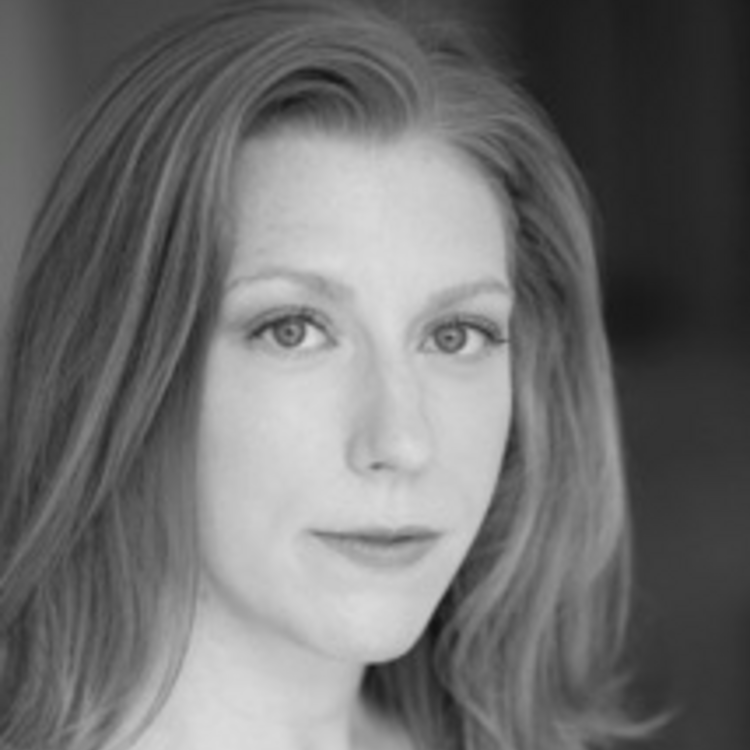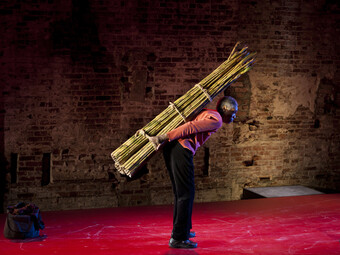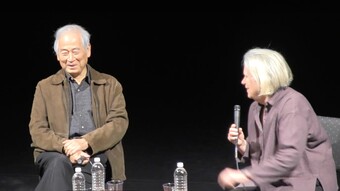Lessons in Acting
How to Be Small
Not long after I moved to New York, I found myself making millions of excuses why I couldn't go on auditions. I wasn't ready. I was rusty. I was nervous. I wanted to be settled. I didn't have a stable job. I didn't know the city. There weren't any good auditions out there. People would ask me, "how's the auditioning going?" and I'd quickly switch the subject or offer up an explanation and away the conversation would go.
But then I got scared. I got scared of not pursuing my dream. Of watching it fade into the distance behind me, accompanied by all the excuses I'd armed myself with.
So that August I headed out to my first audition. I stood in the doorway of the G train and faced my reflection, lips moving as I mouthed my monologue and I thought to myself, "no expectations—just getting back out there, no expectations."
But of course it's never that simple. I walked away from that audition feeling good. I was okay with my audition, and more than anything (I said to myself) I was grateful to act again even if for just 45 seconds, even if I didn't get a part. At least, that's what I said to myself. The nerves while I waited to hear back about the show may have put some of that gratitude to the test...
But I got called back. As I said to my friend, (to remind myself) "I'm just grateful for a callback." No expectations.
Though I’d expressed interest in a particular, small, age appropriate role, I was called back for a bigger role. I printed off the sides, the monologue and spent the entire day studying the play, and the character. When I walked into those callbacks I was ready to go.
I tried to convince myself that it didn’t matter if I got the part. But when I looked around the room at all the other actors and then down at my dog-eared side that I’d obsessed over the night before, I realized that I really wanted this. I was going to do whatever it took to get the part.
Two weeks passed and I checked my phone like a crazy person until I realized that if I was going to be cast, I would have known by now. But I hadn't even gotten a rejection email, which seemed weird. So 90 percent of me tried to move on and 10 percent of me wished and prayed and picked up pennies off the dirty New York streets in hopes that I'd get a call.
And I did.
One ridiculously hot day, walking around Queens, I listened to a voicemail offering me the part of the Nurse in Equus. I burst into tears as it sunk in. I'd just fucking gotten cast.
The director mentioned I might be disappointed in the size of my role but at that point I would have been happy to be cast as the horse’s ass. I was just thrilled to be part of the show. To participate in a process that would remind me why, even though theater is hard as hell and disheartening at times, I do it.
But then, the week rehearsals began, I got sick. Like the blowing green snot out of your nose, hacking up small creatures kind of sick. I sat at the first read through really sick and really nervous and really wanting to make a good impression and prove that I deserved to be part of this cast. Instead I lost my ability to do a British accent, read a script and interact like a normal human being.
I walked away from the first read-through ever so grateful that I wasn't called for rehearsal for a few days because I figured it'd give me time to kick the bubonic plague and remove my head from my ass. But when I went back to rehearsal and said my lines it was like having an out of body experience and I wondered what the fuck I was thinking and worried that the director would think that I was that strange creature who looks good in an audition and then bombs their way through rehearsal and production.
I got so far in my head worrying and fretting and focusing on what everyone else thought about me and my performance that it seriously fucked up my ability to create, to let go, to trust that it would come. I obsessed day and night about how to make my few lines significant, to make my part stand out, my character be real and relatable and not just a “sword carrier.” I rambled on incessantly to friends about how much I was struggling and how frustrated I was and consequently every ounce of my energy poured into my insecurities and away from my art.
Before I knew it, I was an actor so caught up in my own importance, or my perceived lack of it that I lost sight of everything else. I went from being the ecstatic-to-be-cast actor to the insecure-mess-actor coming home from rehearsal in tears because I was madly uncertain about the work I was contributing to the show.
I'd stomp my way to the subway not knowing what the fuck my character was even doing in the play (something that wasn't helped by a review I'd read of the show where the critic pondered why Shaffer even bothered to write such a small, throwaway part) and whether the director regretted casting me or if my cast-mates thought I was terrible.
These insecurities that appeared were things I thought I'd moved past and outgrown. Why was I uber focused on creating a character that would pull attention? Why did I so desperately want her to have a limp, to speak with a lisp, or to be in love with the doctor? And why, dear God why, was I hoisting these things on this woman whose lines and purpose were entirely unambiguous?
Because I wanted to be important. I wanted to prove that I deserved to be part of this play, deserved to be cast in the first show I auditioned for and prove that I could make it in this city.
People kept telling me, "There are no small parts, only small actors" and "small roles can steal the show." And the more I heard it the more I convinced myself I was doing something wrong.
Finally, I realized that while the old adage is true, "There are no small parts, only small actors,” it doesn't mean steal the show, or ham it up or find idiosyncrasies to draw attention to your character, it just means be the bigger actor.
Recognize that the show as a whole is more important than your individual ego, and that the part you're playing, however small it may be, was big enough for the playwright and director to include. So instead of bastardizing the part, pay homage to it, honor it, by finding the truth and relish in the ability to be a small part of something big rather than a big part of something small.
I won't lie. It wasn't until dress rehearsals that I started to get the hell over myself. And while it never really went away, that feeling that my character didn't matter or belong in the life of the play, that the choices I made and the character I finally found were quite vanilla comparatively, I settled down and into the run of a really good play.
But that was the switch. It wasn't myself I was proud of, or my portrayal of the Nurse, but the play that lived in front of me. Of Dysart and Hesther, of Jill and the Horses and Nugget. Of Alan and his parents. Of these actors telling a compelling story and the fact that I was a part of the whole. Of the set design and original music, of the director’s vision and the beautiful cohesion of the cast. I found myself proud of the entire production, and not just my role in it.
I think that anyone who is serious about pursuing an acting career should play a small role. I'm talking sword carrier, fifteen lines, the character a critic calls unimportant—in order to really understand that you can't always be the biggest part, or the starring role and sometimes being small reaps the biggest rewards.
Because ultimately what I had to come to terms with, was that the Nurse was a conduit, primarily for Alan and the Doctor, and the purpose she served had to be met with integrity and care, not the attitude of an actor who wants more lines, or a quirky affect to pull the audience’s attention in order to get a bunch of compliments at the stage door.
Because the fact is, that sometimes to tell a story you have to be the tree or the sword carrier or the nurse, and as long as your heart is in it and you can banish the insecurities, and just tell the truth, you can be successful in that role. But it doesn't need to be anything more, anything bigger than that.
I don’t know if I ever came to terms with my role or my performance. I don’t really know that I need to. What I do know is I walked away from this show eternally grateful for the friends I'd made, and the talent I watched on that stage. I know now I was meant to be a part of the show in the role I played in order to learn that maybe, just maybe, how to be small is the greatest lesson an actor can learn.










Comments
The article is just the start of the conversation—we want to know what you think about this subject, too! HowlRound is a space for knowledge-sharing, and we welcome spirited, thoughtful, and on-topic dialogue. Find our full comments policy here
Awesome story , I’m going to share this with my group !
Thanks for this--I teach high school theater, and regularly deal with kids who don't want to take the smaller roles, and yet we could not do the shows without them. I'm going to share this article with them.
Thank you! I really appreciate you sharing with your students and taking the time to comment. It's teachers like you who shape great artists!
I have sometimes remarked to young actors, "They say there are no small parts. They lied. There ARE small parts. But there are no small commitments - you will be required to show up and work hard."
ABSOLUTELY. I love that, "there are no small commitments." Thanks for the comment!
As a playwright I appreciate that you fulfilled the purpose of the role. Playwrights agonize over every line. And good actors memorize the lines as written and bring to life every character. Playwrights care about each and every character on that stage. You are and were valued as the part you had in telling this story, from the audience perspective and certainly from the playwright's perspective. You'd be amazed how often as a playwright I've found actors are willing to go on stage and "wing it" in terms of doing approximations of their lines. I've had actors "go up" in my plays so frequently it's amazing - one review said "the play begins with an inexplicable pause." Guess what really happened? And the review went on to blame it on the playwright. Of course I will never work with that actress again... but wow.
Hi Amy, thanks for the comment! I couldn't agree with you more. The incredible amount of work, dedication and time that goes into writing a play should be honored and respected. The job of an actor is to take a line, as written, and determine an appropriate and creative interpretation in line with the vision of the play. Thank you for your work and taking the time to read the post!